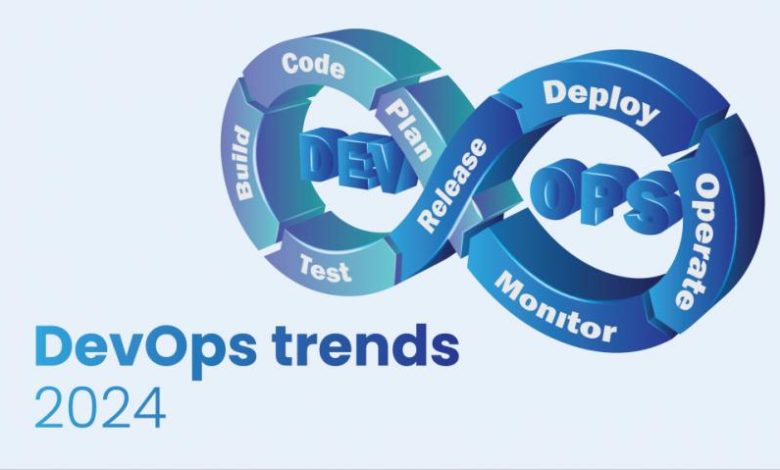DevOps in 2024

What is DevOps?
DevOps is a combination of development and operations. It promotes collaboration between software developers and IT operations. The goal is to shorten the development lifecycle. This approach improves software quality and enhances delivery speed. In 2024, DevOps continues to evolve rapidly. This article discusses the trends and future of DevOps.
The Evolution of DevOps
DevOps has transformed how organizations deliver software. Traditionally, development and operations worked in silos. This separation led to delays and misunderstandings. DevOps emerged to bridge this gap. By fostering collaboration, teams can work together more efficiently.
In recent years, DevOps practices have matured. Organizations have embraced automation, continuous integration, and continuous deployment. These practices streamline processes and reduce manual tasks. Consequently, teams can focus on innovation rather than routine work.

Key Trends in DevOps for 2024
Several trends are shaping the DevOps landscape in 2024. These trends highlight the ongoing evolution of the practice.
1. Increased Automation
Automation is at the heart of DevOps. In 2024, we see a continued emphasis on automating repetitive tasks. This shift allows teams to focus on higher-value activities. Tools like Jenkins, GitLab CI, and CircleCI facilitate automation in testing and deployment.
Moreover, automation reduces human errors. By automating processes, organizations can achieve greater consistency and reliability. As a result, teams can deliver software faster and with fewer issues.
2. Emphasis on Security
Security remains a top concern for organizations. In 2024, DevOps integrates security practices into the development lifecycle. This approach is known as DevSecOps. By embedding security into the workflow, teams can identify vulnerabilities early.
Security tools and practices are becoming more automated. Organizations can use static and dynamic analysis tools to scan for issues. This proactive approach helps mitigate risks before deployment.
3. Enhanced Collaboration Tools
Collaboration tools are essential for DevOps success. In 2024, we see the emergence of advanced collaboration platforms. Tools like Slack, Microsoft Teams, and Jira facilitate communication between teams.
These platforms integrate with other DevOps tools. They provide a centralized space for discussions, updates, and task management. Improved collaboration leads to better alignment and faster decision-making.
4. Shift-Left Testing
Shift-left testing is a trend gaining traction in 2024. This practice involves testing earlier in the development process. By integrating testing into the CI/CD pipeline, teams can identify issues sooner.
Early testing reduces the cost of fixing bugs. It also enhances software quality. Teams can deliver more reliable applications by addressing issues proactively.
The Role of Artificial Intelligence
Artificial Intelligence (AI) is becoming increasingly important in DevOps. In 2024, organizations are leveraging AI for various purposes. AI can analyze vast amounts of data and provide insights.
For example, AI-driven monitoring tools can detect anomalies in real-time. These tools help teams identify issues before they escalate. Additionally, AI can optimize deployment strategies by predicting potential failures.
Machine learning algorithms can analyze historical data. They can suggest improvements to the development process. By harnessing AI, organizations can enhance their DevOps practices significantly.
The Importance of Continuous Learning
Continuous learning is essential in the fast-paced tech environment. In 2024, organizations are focusing on upskilling their teams. Training programs and resources are crucial for keeping skills up to date.
Online courses, workshops, and certifications are widely available. They allow professionals to enhance their knowledge of DevOps practices and tools. By investing in continuous learning, organizations can ensure their teams remain competitive.
DevOps in Cloud Environments
The adoption of cloud technology continues to grow. In 2024, DevOps practices are increasingly integrated into cloud environments. Cloud platforms like AWS, Azure, and Google Cloud provide tools for DevOps.
These platforms offer scalable infrastructure and services. They enable teams to deploy applications rapidly. Additionally, cloud-based DevOps tools enhance collaboration and automation.
Organizations can leverage the cloud for continuous integration and delivery. This approach reduces the need for on-premises infrastructure. As a result, teams can focus on development rather than managing hardware.
Measuring DevOps Success
Measuring the success of DevOps initiatives is crucial. In 2024, organizations are focusing on key performance indicators (KPIs). Metrics such as deployment frequency, lead time, and change failure rate provide insights into performance.
Teams can use these metrics to identify areas for improvement. Regularly reviewing KPIs helps organizations stay on track. It also fosters a culture of continuous improvement.
Moreover, organizations are using feedback loops. These loops enable teams to gather input from stakeholders and users. By incorporating feedback, organizations can refine their DevOps practices.
Challenges in DevOps Implementation
Despite its benefits, implementing DevOps comes with challenges. In 2024, organizations face various obstacles. Resistance to change is a common issue. Teams may be hesitant to adopt new processes or tools.
Additionally, integrating DevOps into existing workflows can be complex. Organizations must invest time and resources to ensure a smooth transition. This effort includes providing training and support to teams.
Another challenge is maintaining security while promoting agility. As organizations strive for faster delivery, security cannot be compromised. Balancing speed and security is essential for successful DevOps implementation.
The Future of DevOps
The future of DevOps is bright. As organizations continue to embrace agile methodologies, DevOps will play a crucial role. The focus will shift toward automation, security, and collaboration.
Moreover, the integration of AI and machine learning will enhance DevOps practices. Organizations that leverage these technologies will gain a competitive edge. Continuous learning will remain vital for teams to adapt to evolving trends.
As the tech landscape changes, DevOps will evolve. Organizations must stay agile and be willing to adopt new practices. By embracing innovation, they can thrive in the digital age.
Conclusion
In conclusion, DevOps is an essential practice in 2024. It fosters collaboration, enhances software quality, and accelerates delivery. Key trends, such as increased automation, security integration, and cloud adoption, shape the future of DevOps.
Organizations that invest in DevOps will gain a competitive advantage. By measuring success and overcoming challenges, they can continuously improve their processes. The future of DevOps is full of potential, and organizations must be ready to embrace it.




